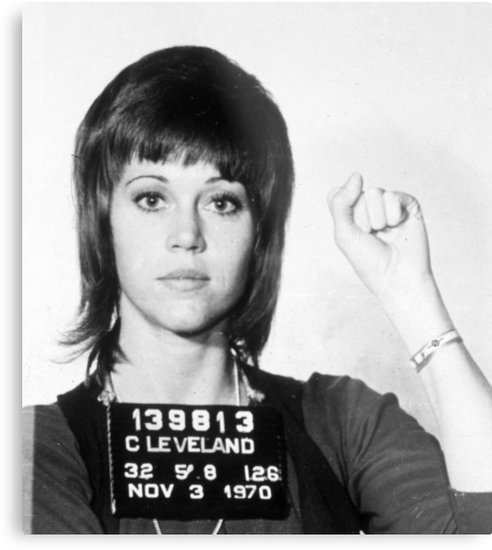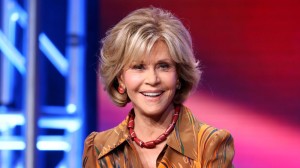 The lengthy documentary “Jane Fonda in Five Acts” (HBO, 8 p.m.) begins not with any men who define four of the five “acts” in which the film is divided.
The lengthy documentary “Jane Fonda in Five Acts” (HBO, 8 p.m.) begins not with any men who define four of the five “acts” in which the film is divided.
It starts with Richard Nixon on one of his tapes, just musing.
“Jane Fonda,” he says on the tape from September, 1971. “What in the world is the matter with Jane Fonda? I feel so sorry for Henry Fonda who is a nice man. She’s a great actress. She looks pretty. But boy, she’s often on the wrong track.”
For all her achievement as actress, activist, exercise guru and cultural icon, why begin with the only president who resigned to avoid impeachment?
“Because it’s genius. It’s fabulous, I love that,” Fonda told me when I asked. “It totally took me by surprise.”
The film was put together by Susan Lacey, who made bio films for years at PBS’ “American Masters,” and the choice was ultimately her’s, but Fonda approved. “It’s hysterical, don’t you think?”
She had been aware of the Nixon comment since she wrote her own autobiography, “My Love So Far” in 2006.
“I went to the archives,” Fonda says. “I knew what Nixon had said and I knew what the FBI said, I knew what the treasury people had said about me.”
She had been followed for months by federal agents.
“I know that the guy that was assigned in the Justice Department to find causes for indicting me for treason and he said, ‘She didn’t commit treason, she was just trying to get the soldiers to think.’”
“First of all, finding it was a big deal, and getting it,” Lacy said. “And I wanted a signal that this was not a film about a movie star. I wanted to signal that right up front. Jane is a great movie star, she’s a great actress but that is not I think the heart of her story.”
“I never thought she was going to use that to open the film,” Fonda said. But “when I saw it I couldn’t stop laughing, I thought it was just brilliant.”
 Their comments came at the TV Critics Association summer press tour. It wasn’t the first time I had a chance to ask Fonda some questions. Thirty-seven years ago, I covered the world premiere of her film “On Golden Pond” in Omaha, where her co-star and famous father Henry Fonda had grown up. But a decade before that, I sat cross-legged at somebody’s house, also in Omaha, to hear the activist Fonda talk about her antiwar activism and visit to Vietnam.
Their comments came at the TV Critics Association summer press tour. It wasn’t the first time I had a chance to ask Fonda some questions. Thirty-seven years ago, I covered the world premiere of her film “On Golden Pond” in Omaha, where her co-star and famous father Henry Fonda had grown up. But a decade before that, I sat cross-legged at somebody’s house, also in Omaha, to hear the activist Fonda talk about her antiwar activism and visit to Vietnam.
Her actions then were a turning point in what up to then was a pleasant movie acting career. She became a catalyst and target for those who opposed her viewpoint in a time that was even more divided than today.
It’s no surprise that time is emphasized in the new documentary, but it may be a surprise that she is still a target of the right wing half a century later.
“I like it when they come to me and it’s not positive because it’s an opportunity to talk,” the current star of the comedy “Grace and Frankie” says. “And you have to do that with a very open mind and a soft heart and be forgiving and understanding. So I welcome those opportunities a lot.”
Sure, there are those who approach her and thank her for her activism.
“It makes me feel good,” Fonda says. “And the ones who aren’t coming from where you’re coming from, it makes me know that they still, after all this time, haven’t learned the nature of the war and why we fought it. And that’s sad.
“I’m proud that I went to Vietnam when I did, and I’m proud that the bombing of the dikes stopped. But, you know, what I say in the film is true.”
She said she regrets being photographed in North Vietnam sitting on an anti-aircraft gun. “I’m so sorry that I was thoughtless enough to sit down on that gun at that time, and the image that sends to the guys who were there and their families. It just horrible for me to think about that.”
Fonda was asked why she agreed to have the film divided according to men in her life — her father Henry, who was cold to her, and her three husbands, Roger Vadim, Tom Hayden and Ted Turner.
“Well, they were all so brilliant and they could teach me things and take me farther than I had ever gone,” she said. And: “They weren’t boring.”
Another consideration was that despite her stardom, “I just didn’t have very much confidence, and I thought that if I was with those kind of men that I could be somebody.”
Actually, that structure is based on Fonda’s 2006 memoir, but Lacy says, “I was interested in what had happened in the 15 years, between the time Jane wrote the book and Jane today.”
To do so, there were over 20 hours of interviews with Fonda alone. And her voice certainly dominates the film, which she says is “ very hard for me to watch actually.
“It’s not easy, in a time like this, to talk about myself so much. I find it a little bit awkward,” she says.
But there is a theme in the film, about change and reinvention.
“I’m still changing,” Fonda says. “I’m only 80, and you know, there’s still a few decades to go, if I’m lucky. And why be alive if you’re not learning and changing and growing? I think that the purpose is to try to figure out how do you keep doing it. You know, you may not be able to make your life longer, but you can make it deeper and wider.”